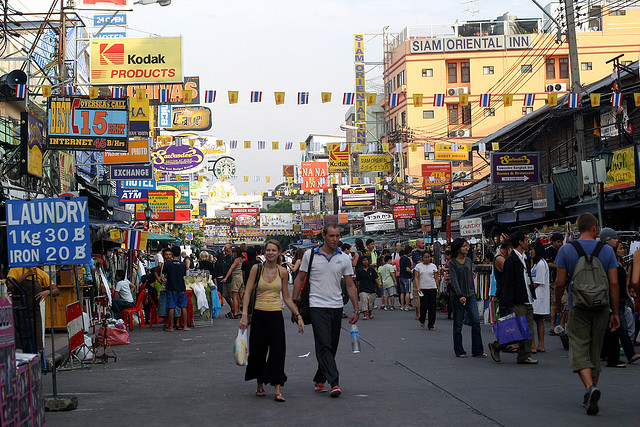Where you lay your head at night is an important part of long-term travel – you gotta sleep some time, right?
Options abound for travelers these days – long gone are the days of hostels and hotels as your only option.
In the past, it seemed like most RTW travelers stayed in hostels, not only because it’s cost effective, but because they’re great places for meeting other travelers and getting tips and advice for exploring that particular city.
Other Accommodation Options
The hostel vs. hotel debate has been beaten to death. Everyone has their own biases and preferences, so we won’t deal any more with that here. But did you know that hostels, hotels, and guesthouses aren’t the only options when traveling, particularly when on a RTW trip?
Rent an apartment
If you plan on staying somewhere for a week or more, then consider renting an apartment. There are a variety of websites who specialize in rentals around the world.
- VRBO is a great place to start looking in cities all over the globe, though I’ve personally found they are typically the priciest (though there are deals to be found).
- Airbnb is another good site to try, especially for budget travelers, as you they offer the option of renting rooms in people’s apartments/condos/houses rather than renting the entire place (though that is also an option).
- Flipkey and Homeaway are both trusted sites with options all over the world.
If you can’t find anything on any those sites, then just hit up google and start searching in the city you are looking to find a place.
We decided to stay in Buenos Aires for a month on our RTW trip, and it was one of the highlights of our trip. We found an apartment for $750US for the month, which comes out to about $25/night, a bargain compared to hostels and hotels in the area. Plus we had our own, private place, our own kitchen, and it really gave us the opportunity to get to know the city on a much deeper level. By the end of the month, we had regular coffee shops we went to, markets we bought our produce from, and bars we frequented. It became our home away from home, and it was so nice to unpack our bags and have a place to call home for a bit.
Traveling slowly can be a major positive when on a RTW trip. After a while, traveling nonstop gets exhausting, and travel burnout is a real thing that can set in before you know it. By taking a few weeks or a month here and there to settle down and really get to know a city and culture, you can change the course of your trip. Plus it should be a major plus for the budget.
Price and book a rental for your big trip.
Couchsurfing

People who have never done it are nervous and have subscribe to certain myths about couchsurfing. If you are not familiar with the couchsurfing phenomenon, then you may want to read this article that tells you all you need to know about it.
The best way to explain couchsurfing is this: A traveler needs a place to stay in a particular city. People living in that particular city usually have an extra couch or in some cases a room. Those people hook up on the internet at Couchsurfing. A relationship is born, and the traveler has a free place to stay. Some may think this is terribly unsafe, but the service is there for because the demand is high, both for travelers and hosts. If it truly is unsafe, it wouldn’t be as popular as it is.
Couchsurfing is more than just a free place to crash though. Their mission statement says, “Couchsurfing seeks to internationally network people and places, create educational exchanges, raise collective consciousness, spread tolerance, and facilitate cultural understanding.”
You may think that all couchsurfers are drunken college students, both travelers and hosts alike. But you couldn’t be more wrong. Couchsurfers run the gamut from college kids to retirees and everyone in between. Married couples, families, solo travelers – they can all benefit from couchsurfing. It’s a very well set up organization, and travelers can be rejected if they don’t fit the profile the host is looking for. This allows everyone, both traveler and host alike, to be placed in a great situation.
Though Couchsurfing has gone through some trouble in the past couple years that makes finding the right opportunity more challenging than in their heyday, it’s still a good option, and you should at the very least look into it during your trip.
Read more on the most recent problems that have plagued the Couchsurfing community:
- The End of a Dream: Couchsurfing’s Fall
- Lost Roots: The Failure of For-Profit Couchsurfing
- Re-Realizing the Dream: How to “Fix” Couchsurfing
- What Couchsurfing Meant to Me
Booking Ahead or Waiting Until Arrival
Everyone travels differently, so what you do in this situation is completely up to you. There are some who just like to have all their ducks in a row, so they book all their accommodations before arriving in a new place. Then there are others who like to fly by the seat of their pants, arriving in a new place and wandering around until they find the one that’s right for them.
There are pros and cons to each method, and you’ll most likely employ both throughout your big trip.

When you want to book ahead
Some people just like to be organized so if you’re one of these people, you may just want to always book ahead for peace of mind. If you use this tactic, may I suggest only booking your first night just in case the place you choose is a nightmare. You never know when you’re going to have buyer’s remorse. You also never know how you’ll like a certain city or area of the city until you get there.
The descriptions could turn out to be completely different than what you expected, and if you are visiting a huge city like New York, Buenos Aires, or Mumbai, you may be better off in a completely different neighborhood across town. If you book for a week, most places will charge you a fee to cancel, so there’s really no need to book more than a night or two if you’ll be doing it in advance.
If you are going to be traveling in a region during high season, certain holidays, or festivals, then it’s always a good idea to book ahead of time. These are the times when hostels and hotels are at capacity, so just turning up with no place to stay is typically not a good idea. In some cities during certain times of the year (for example, Rio for New Year’s Eve and Munich for Oktoberfest), accommodations can book up months if not a year in advance, so you need to be on top of things if you plan on hitting up a major world festival or event.
When arriving into town late at night or really early in the morning, it’s probably a good idea to book at least a night’s accommodation. No one likes to wander around town late at night schlepping all their bags and stuff along with them while looking for a place to stay. Just book a room for one night, and if it sucks, you can always leave and explore the next day.
When you want to wait until arrival
If you are the kind of person who likes exploring and really checking a place out before committing, then you may want to start waiting to get a room until you arrive. This is another instance where packing light is really nice, as you certainly don’t want to wander around a city like La Paz, Bolivia, at super high altitude with crazy steep streets, with a 50 pound pack on your back.
If you are arriving in a new city in the morning or afternoon, and it’s not high season or a major event, then you will have no problem finding a place to stay. Being able to walk around and check out the rooms, common rooms, kitchens, and getting a feel for the vibe of the place is invaluable, especially if you plan on staying for several days or a week. Where you sleep is important to most people, so you might as well take a few hours to find the place that’s best for you.
Unless you are arriving late at night or after a particularly long and grueling bus ride, there’s really no need to book in advance in most situations. Sure, after being on the road for several months you may want to start booking ahead of time more often just to save the hassle, but waiting until you arrive provides many benefits. In addition to actually seeing the place before you commit, you may also be able to negotiate a better price than you would have otherwise gotten by booking online.
If you arrive in a city during shoulder or low season, rooms will not be full, period. Most owners and managers subscribe to the idea that a room at half price is better than an empty room, so go ahead and negotiate. Use the hostel next door as a bargaining chip. You’ll be shocked at how low you can someone when it’s not in high season. Most places want full beds, and many will do what it takes for your business.
There are lots of things to contemplate when it comes to where to stay when traveling long term. Everyone has their own preferences, and if you are a first time RTW traveler, you really don’t know what to expect. Chances are you will employ a combination of all the above tips, staying in hotels, hostels, guesthouses, and maybe even on some random person’s couch. The key is to be prepared. Preparation simply makes everything easier, and having a plan in place that is easily adaptable will make your RTW trip as smooth as can be.
Photo credits: 1, 2
[more link=”https://www.bootsnall.com/rtw/buying-stuff-while-on-the-road.html”]Next: Buying Stuff While on the Road[/more]